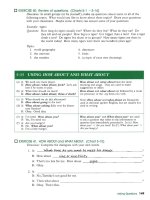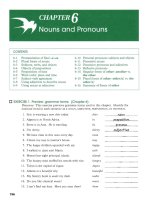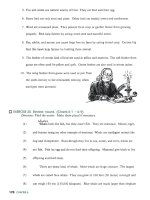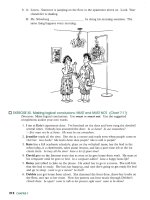Ship or sheep third edition part 15 pptx
Bạn đang xem bản rút gọn của tài liệu. Xem và tải ngay bản đầy đủ của tài liệu tại đây (454.87 KB, 7 trang )
€8,,
unr 24
tbtbaby
I0
man
Stop sounds
The
sounds
lpl
,
lbl, ltl, ldl,
lkl
,
lgl are
'stop
sounds'. If they
come at the
end of
a
word,
stop -
don't
add another
sound.
Match
these
compound
words.
EXAMPLE
shopkeeper
(Remember
to
stress the first word.)
Look
back over this
unit at words
with
the target
sound, and write what
you
noticed
about how to
spell the
sound /b/.
shop
r._
ball
pet
\
keeper
hip
board
blood
shop
black
beach
bank
Now listen
and check your
answers.
book
bus
bath
back
base
pepper
mint
robe
shop
ball
stop
pack
5 Spelling
89
Itl table
- Lrcuse
me. Could
you tell
me the
time, please?
fr,
%t'
-'tes.
It's
exactly
nty minutes to
ten.
-
[hankyou.
I Target
sound ltl
,'
a
To make
the target sound
/t/, first
put
your
tongue behind
your
top teeth.
Then
push
air forward
inside your
r.
mouth.
**Then
quickly
move the tip
of
your tongue away
from
your
teeth
^r._+-
to
release
the air suddenly.** Don't use
i'
your
voice. Listen and repeat: /t/.
,
,
:r'
b
Notice that sometimes /t/
is
quieter
'
because the air isn't released suddenly.
Listen.
what forget doesn't breakfast minute minutes it's exactly
Omit
from
*x
to
xx
above to make
this
quieter
sound.
2 Sound /t/
sent
You sent the emails?
cart
ls hers
the
red
cart?
write
Can he
write well?
Does
this train
trunk
ls
there a trunk
here?
Itl
too
You too?
4-, Bffi.
a'
6-T;lfo66llli
.+ry""4r
.r'lNffiN
Etru
-:ll=="
train
smell?
r@
!10 unr25
rt,
tablc
Be2e
a
In the words on
page
89, notice that the target sound
is
quieter
in the
words
sent, cart and write. Listen
and repeat the words.
ngzr
b
Listen to the sentences.
nszb c Sentence stress
Listen
to the
YeslNo
questions
again
and repeat. Notice how the
voice
begins to
go
u.t' on the most important
word for
the speaker's
meaning.
This word
is
spoken
with
a
very
strong
stress.
You
t& ?
lktu
sent
the emails? Is hers the red cart?
Can
he wlite well? Does this train srHell? Is there a trtnk
here?
5
Dialogue
C.
ni.rt
practise
the target sound /t/ in words from the dialogue.
Read
the
words aloud or
visit
the
website
to oractise.
/t/ is LOUD before a vowel.
One-syllable words: two to top ten tell tins
Thai time
TWo-syllable words: counter upstairs
Three-syllablewords:customer telephone tomatoes
Four/five-syllable
words:
photographer
cafeteria
Notice how two /t/ sounds
join
together.
I want_to take the lift_to the top. The telephone is
next_to
the cafeteria.
/t/ is
often
quiet
at the end of
a
word.
hat coat
skirt
shirt
first want what
get got
right
cricket
bat
opposite supermarket
'What
happens if the next word
begins
with a vowel?
I
want_a
hat_and a coat_and a skirt_and
a
Practise a
quiet
ltl here before a consonant.
hats
coats
skirts shirts eighth
what's
restaurants
cricket bats
Sometimes
there
will
be loud and
quiet
/t/ in
the same
word. Decide if
these are loud
(L)
or
quiet
(Q).
EXAMPLE assistant
(L
Q)
travelagent(
)
twenty-two(
)
tonight(
)
student(
)
important() departmentstore(
)
tomatoes(
)
toilet
Now look
at the
words in the
box
below and decide whether the target
sound is loud
(L)
or
quiet
(Q).
EXAMPLE to
(L),
skirts
(Q)
to
(
)
skirts
(
)
basement
(
)
telephone
(
)
cricketbat
(
)
exactly() cafeteria()
tomatoes() fruit() tell() top(
Thai() time()
next()
)
Check
your
answers
in
the
key
before doing the
next exercise.
UNn
25
'tr
tablc 9I
b
Read
the dialogue below and
guess the missing words with the sound /t/
Number 1 and a)
have
been done as examples.
l-7 have
a
louder ltl; a-g
have a
quieter
/t/. Check
your
answers by looking
in
the box of
words on
page
90, and then by listening to the dialogue.
*
n 3eDartment
store
CUSTOMER l: lwantlto buyaskirt.
ASSISTANT: a)Skirts are upstairs on the next
floor.
CUSTfJT\IER
?: Where can I
get
some 2 food?
A55lSTAN'I: The cafeteria is on the first floor
{U5r0tu'lf;R :: Where's the
b)
juice,
please
ASS|STAI,JT: The c)_ counter on
your
left
CUSTOMER +: Tins
of I
ASSISTAT{T:
Try the supermarket
in
the d)_
CUSTOMER s: Could
you
4-
me
where
the erm
travel agent's is?
ASS|STANT: Yes lt's right next to the e)_ on the third floor
CUSTOMIR
6: I want to buy
a
f)_ How do I
get
to the the um
sports equlPmentT
ASSISTANT: Take the lift to the soorts deoartment. lt's on the s
floor
CUSTOMER
l:
Where's the o
_ ,
please?
ASSISTANT:
lt's
on the next
floor
opposite the
photographe/s.
CUSTOMER e: What's the z
_,
please?
ASSISTANT: lt's
g)_
twenty-hruo mrnutes
to ten.
c Practise
reading
the dialogue aloud.
Record your voice to compare
your
production
of the target sound with the
recording.
rr !r a
Read the information and
listen
to the examples on the
recording.
ln YeslNo
questions,
intonation usually begins to
go
up on the most
important word
for
the speaker's
meaning.
EXAMPLE Could
you
tell
me
the time,
please?
In I4lH
questions, intonation
usually begins to
go
down
on the most
important word for the speaker's meaning.
EXAMPLES tthat's
the time,
please?
How do
I
get
to the
sports equipment?
\4lhere's the toilet,
please?
92
UNIT 25
/ti
table
Notice
that intonation
in I4lH
questions
can
change when we
are talking
about
old information.
The first
time we
ask
somebody's name, we
ask:
I'Vhat's your
name?This is
new information.
But if we then
forget the
name
and ask again,
we
ask:
tMhat's
your
name?
because we
are asking
about old
information
that
has already
been
given.
Intonation goes
up
to
show that
this is something
we have
already
shared.
sgs
b
Listen
to customers
at the information
desk in a
department store.
Some
of them
are asking
for new
information.
Some
of them want to
check old
information
they have
already received
just
now
or in the
past.
I \.A/here's
the fruit
juice?
(asking
for
new information)
2 Where's
the fruit
juice? (checking
old
information)
3
\,Vhat's
on
the
next floor?
(asking
for new information)
4 How
do I
get
to the restaurant?
(asking
for new
informationl
5 How
do I
get
to the restaurant?
(checking
old information)
6 Which floor
are computers
on?
(checking
old information)
Be6
c Listen
to more
customers
at the
information
desk and
decide if they. are
asking for
new information
or checking
old information.
Numbers I
and
2have
been
done as
examples.
Inew2old3
5_
6
7
d Role
play
Practise
with
a
group
of
4-5 people.
Take turns
to be the
assistant at
the
information
desk in
a department
store. The
others
ask
questions.
You
can sometimes
choose
to check
the information
(either
straightaway or
later)
by
asking the
same
question
again with
a different
intonation.
First
practise
the word stress
in these words you
may
use.
restaurant
telephone
travelagent's
supermarket
sports
department
toilet cafeteria photographer's
fruit
juice
computers
notebooks printers
photocopiers
cricket bats
football
boots hot water
bottles
blankets heaters
4
B
5
Spelling
Look back
over this unit
at
words
with
the
target sound,
and write what
you
noticed
about how
to spell
the sound
/t/.
95
N
r dl
door
,.
r'ou
want
to
go
out to a restaurant for
,f,
::ner tonight?
"-
. It's
too cold
and
dark. And I'm
too tiretl.
I rather
stay at home
and
read a
good
book.
' -arget
sound
/d1
a First
practise
the sound /t/
(see
page
r
89). Listen and repeat.
b
Use
your
voice
to
make
the target
sound /d/. Listen and repeat.
*-
c Listen
and
repeat
both sounds
together.
'\
\
/t/ is unvoiced. /d/ is
voiced.
,
d Notice that sometimes
/d/
is
quieter
because the air isn't released suddenly. Listen.
good
food
goodbye
friend
child bird
birds
-
Minimal
pairs
$ound
2
lcll
do
You do?
sent
send
sent the emails? You send the emails?
2
I
Sound
I
Itl
too
You
too?
catt
ls the red cart hers?
write
Can
he write well?
train
Does this train smell?
trunk
there a trunk outside?
cald
ls the red card hers?
ride
Can
he ride well?
drain
Does this drain smell?
drunk
Is there a drunk outside?
94
ul.|r 25
tli dr;or'
Minimal
pair
words
Cra
d
Listen
and
repeat
the words. Notice
that
the
target sound is
quieter
in
the words send, card,
ride.
ceu b
You will hear five words from
each minimal
pair.
For each word, write 1
for
/t/
(sound
l) or 2 for ldl
(sound
2).
EXAMPLE
Pair l: 2,I,2,1,2
Minimal
pair
sentences
c+a
c
Listen
to the
minimal pair
sentences.
c+u
d
Listen to
six of the sentences and write I for
ltl
(sound
l) or 2 for ldl
(sound
2)
c4a e Sentence stress
Listen to
the
minimal
pair
sentences
again and underline the sentence
stress
(on
page
93).
EXAMPLE You send
the emails?
(
5 f
Tick
the words a) or b) that
you
hear in the sentences.
I a) wriring
!
b) riding
tr
2a) cart
t]
b) card
I
3 a) bat
t]
b) bad
I
4 a) senr
tr
b) send
I
5 a) sight
f
b) side
tr
6a) try
tr
b) dry
I
,
Dialogue
C
u
firtt
practise
the target sound /d/ in
some
words
from the
dialogue.
Read the words
aloud or
visit
the website
to
practise.
/d/ is LOUD
before a vowel.
/d/
is
often
quiet
at the end of
a
word
or before a consonant.
stayed repaired It rained.
bad cold They
played
cards.
What happens
when /d/ at the
end of a word is followed
by a
vowel?
They stayed_at home. They
repaired_it
today. It rained_all
day.
I had_a
bad
cold.
They
played_a
game
of cards.









